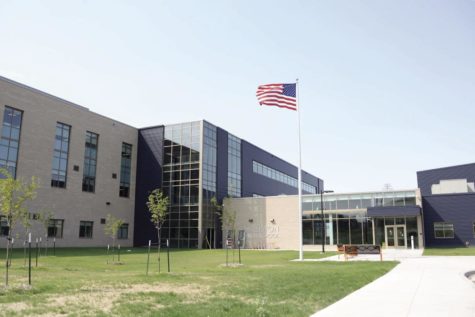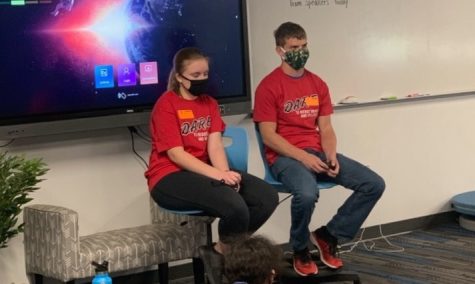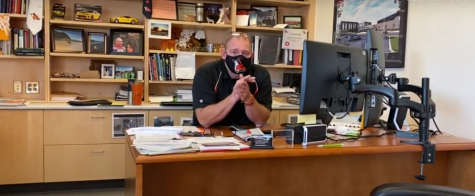Del Español To The English School ! Part 1

December 12, 2018
Del español to the English school!
My name is Julian David and I have been here in the USA for 2 months. I’m from Neiva, Colombia.
We tend to think school is the same around the world but is it? We have two students that know how different it truly is. Marta Cuartero and Julian Rojas, who are in the journalism program, moved to Williston from two completely different countries. We had the chance to sit down with them just to see their perspectives.
The difference of the education of a country in Latin America with so much social inequality to one that is a world power, is abysmal, beginning because the investment they invest in education is of the percentage of 4.9 of the GDP, thus being the lowest investment in education. In this region, the education sector in Colombia is assigned to each student an average of $ 3,291, the lowest figure found in studies conducted in different countries.
Public schools in Colombia are not very well maintained, so people who have enough money prefer to enroll their children in private schools since many have more instruments than those in public schools, the floor of schools in Colombia is not covered with carpet but it is covered with tiles, in fact in a school that I attended some classrooms had holes in it floor so if you put the chair the hole could fall, as I saw one of them my partner fall once, the seats are some chairs called pupitres where you have a place to write that is attached to the chair, unlike here that you have a chair with a table that you give to each student which provides more space for the work and more tranquility.
In Colombia, unlike here, the teachers did not have their own classroom, the students were assigned to a classroom and the rest of the school period had to stay, the teachers were the ones who had to change each class depending on which room they had to dictate his class, and the school grades assigned him a teacher who was the group director who coordinated the group of students.
The boards are the same as they have here, but at least in the schools I was in I did not see projectors, much less the sensors that allow you to control the screen from the board, the topics are written and explained on the board, or where I studied there was an audio-visual room where every teacher had to schedule an appointment if they wanted to explain a topic that would require exposing a video to the students.
The school period began at the end of January, or at the beginning of February (depending on whether the school is public or private). In June, the student goes on vacation for 1 month, and the end of the school day is at the end of November or at the beginning of December ( it depends if you lost the class or not) and you start again the other year.
Classes unlike here are not repeated every day nor as time goes by they change, it is a single class per week, the most important are usually 2 hours in a row on the same day, which classes are more topics for class since they only have 1 space per week. the qualification for the works was from 1.0 to 5.0, the minimum required to pass a class was 3.0 there are 4 periods divided in the whole year in which at the end of the year they were added and divided by the number of periods and they gave you the results if you passed class, and when you finish grade 11 you graduate from high school and you can go to university, not like here that you have to finish the 12th grade to graduate.
One of the social aspects is that the Colombian when he meets someone new, usually makes friends quickly is a bit talkative and does not have that awkward silence that is usually when you are with someone you do not know, often break the ice quickly avoiding that moment uncomfortable and interacting quickly, the Colombian is cheerful and always has a topic of conversation and that is very noticeable in the classrooms in which there is always an uproar of talkative students to the point that the teacher has to shout loudly to call them Attention and asking the students to keep quiet, as it almost happened every day when the teacher left the classroom because he finished his time at that time was taken to chat because in the classroom they were not allowed much talk when the teacher was dictating the class, but in spite of all these cultural flaws in the school a good environment of childhood and adolescence is lived where each The problem that was experienced in school is remembered with grace as the years go by. Of course this is my experience and not all the classrooms and schools are as reported here, I have also seen rooms arranged.
Colombia is one of the countries with more school dropout, I have seen several cases, 1 student became pregnant in the 9th grade at age 17, who at that time left school by his state, to this day I do not know if she returned his studies or he dedicated himself to taking care of his son.
Another reason that is seen is that they do not call attention to continue studying, do not see it as something productive at the moment, prefer to work on what comes out, even if the minimum wage is seen as something more productive, something that It is not like that because when the student grows up and has a family, he will require more money and for that he will have to finish his studies.
In Colombia, we have uniforms that are only used for physical education and another that is used the rest of the days in which a school activity that requires physical exercises is not required.
I have also seen in my country where teachers stop school and stop working because the government itself does not pay them fully, or because of the low salaries of new teachers or resource problems. Not long ago there was a student strike of the universities because they lack much more money to be able to function well, the government instead of providing more resources increased the budget for the military armament, incoherently done since a peace process was held 2 years ago in which demobilized, the largest guerrilla in Colombia, therefore, it is stupid to increase the budget of the armament, knowing that it will not be used, the same military weaponry that they used years ago.
And I finish with this anecdote that happened to me when I was in the eleventh grade.
It was a day like any I had finished the last hour and then I was leaving school and I see that 2 people start fighting, it turns out that one of them was looking lustfully at the girlfriend of another guy, for which a fight started, they crawled in the floor and then, in the end, the guy who had looked at the girlfriend was humiliated, he continued to attend normal days went by and I arrived at school waiting outside (because they do not open the door until the time of entry) and Suddenly a guy who was sitting on his motorcycle right next to me, pulled out a gun, and there was another with him, they pointed the gun at his face to the boyfriend of the girl threatening him that he was going to shoot him, after that they started to fight, to show who was the most “Man” in the end the guys left the guns and stopped fighting and the 2 stopped attending classes.
The period was ruined by a stupidity, like a fight, violence was more than reason and dialogue, and that is something I have seen a little in my country, where at the moment it is a country full of political polarization, it is a delicate subject to speak publicly of that, since there are many people with radical opinions, but to my personal opinion, it is a country that little by little is advancing, we have to change many things in our country, beginning with the politicians that we chose, knowing which is the real real information and have respect for people who think differently, since Colombia is a religiously conservative country, culturally and many other factors which prevent us from taking beyond the resources so rich that we have in our country starting with the middle of 21st century production, which is not brute force like that of the last century, is culture, brain, and knowledge, it is the real resource that is worth exploiting in a nation.








